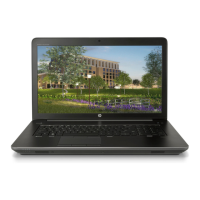1. Test essential hardware conguration (11. Test with minimum conguration
on page 92, 12. Test with veried working conguration (hardware and/or
operating system) on page 93, 13. Replace the system board on page 93) by
removing nonessential parts.
2. If there is still no boot, replace system board.
Tips and tricks Computer automatically boots without pressing power button when RTC 3V battery
has been removed. Therefore, after the service door and RTC 3V battery are removed,
no need to press power button from top side.
In essential hardware conguration, mWS G1 and G2 may require discrete GPU to boot.
However, mWS G3 can boot with integrated graphics.
See “Overview of How to Troubleshoot Problems When a Computer Does Not Start Up
or Boot Properly” at http://h20566.www2.hp.com/hpsc/doc/public/display?
docLocale=en_US&docId=emr_na-c01443371
Intermittent power-on, shutdown, reboot
Symptoms
●
Does not always turn on
●
Intermittently hangs
●
Intermittently shuts down
●
Spontaneously reboots
Possible causes
Electrical short, uctuating power source, unstable power rails, loose connections, bent pins,
stray wires, dust, obvious damage, nearly faulty parts (bulging/leaking capacitor).
Potentially will turn into a no power issue soon (No Power on page 96).
Troubleshooting steps
1. Make sure drivers are updated.
2. Visually check power ports on both AC adapter and computer sides.
3. Inspect power sources:
a. Verify AC adapter working correctly. Use a conrmed working adapter to test.
b. Verify that battery is not depleted while system is in Sleep state. Test with a
conrmed working battery.
The sections below are intended for authorized service providers/technicians.
1. Follow actions in No Power on page 96.
a. Be sure that AC adapter has correct DC voltage.
b. Verify battery - test with a conrmed working battery.
c. Verify that power button is not stuck.
d. Verify that power connector is not loose.
e. Verify that Power Good LEDs are solid.
f. Remedy loose connections and reseat major components (processor, memory, GPU,
hard drive/solid-state drive, etc).
2. Perform visual check for loose connections, bent pins, stray wires, dust, nearly faulty parts
(bulging/leaking capacitor).
3. Test essential hardware conguration (11. Test with minimum conguration on page 92)
98 Chapter 7 Troubleshooting guide

